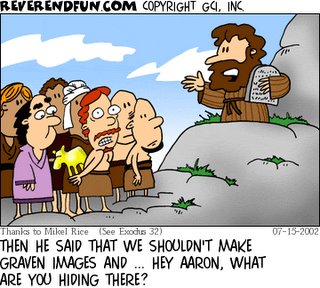
Exodus 20:1-17
1 Corinthians 1:18-25
John 2:13-22
I thought I was being clever. I gave up my second cup of coffee for Lent. This meant that I could have my first cup early in the morning to give me a kick-start to my day. On arriving at the office, I would skip my second cup and go straight to my third cup, fourth cup and perhaps even a fifth. I never even missed my second cup. It isn’t rare at all to find examples on how we are able to rationalise our commitment (or lack thereof) to God, neighbour or self. These three passages have forced me to rethink the level of my (and others’) commitment to this way of living, which is called the Christian journey.
1. Rethinking the 10 Commandments.
When last have you tried to name all 10 Commandments in order? Perhaps we don’t view them as that essential to our faith anymore and have conveniently forgotten them. I like Barrett Renfro’s comments on the 10 Commandments (Disciplines 2006). He reminds us that the 10 Commandments should not be read in a negative way – perceiving them to be a list of “what not to do”. These laws are meant in a positive manner, encouraging life to be filled with meaning. Actions against these laws seem to bring about destruction, not only in the offender’s life, but also in the lives of those whom this sin affects. If we reversed the 10 Commandments, it would lead us to be a very dysfunctional community. Read it like this:
1. You can have all the gods you need to secure your future.
2. You can make idols of anything that exists anywhere, and you can worship them as your gods.
3. You can curse God.
4. You can work seven days a week because economics is the meaning of life.
5. You cannot respect your parents or elders because they are old and know nothing about your life.
6. You can kill.
7. You can have sexual relations with anyone you please.
8. You can take as your own anything you want.
9. You can lie anytime you choose.
10. You can desire anything your neighbour has for your own.
Think about what the 10 Commandments have to say to: Those who killed a little girl last week, robbers, hi-jackers, Jacob Zuma, the South African Government in its approach to HIV/AIDS, those who take their office-pens, able-bodied persons parking in disabled parking-zones. It seems to speak to all of us to a greater-or-lesser degree.
Jesus overturned some tables in my life – the tables where I thought that I had it figured out and that nothing in the Bible could make me think about how I negotiate my own righteousness.
2. Rethinking God’s Wisdom.
Read the 1 Corinthians passage again. It places a focus on God’s wisdom and the role it plays in our lives. What do we measure as wisdom in this life? Is it the ability to predict events, to identify patterns that occur in our daily existence and so counter any problems that may present themselves before they actually realise? Is wisdom “thinking ahead”?
I find that life is a bit more complex than that. Life is spontaneous. The good and the bad occur in such a random order that it is impossible to gain any measure of human wisdom that will leave us totally unscathed by life’s happenings. The ability to be shocked by human behaviour, by tragedy, the ability to be surprised by joyful events, are all indications that we experience life, not as a predictable passing of consciousness, but as travellers on what is sometimes a very irrational-, illogical- and perhaps, a confusing- pilgrimage.
This puts a different perspective on how dependant we are on God. The Good News is that God’s wisdom is not confined to space, time or experience. But this leaves God in a place separated from our daily existence and unable to empathise. This is countered through the Incarnation as well as Pentecost – where God journeys with us, and is able to empathise and to encourage us in times when we need wisdom most.
Some more tables are overturned – the tables where I thought that I don’t need God and can do things on my own.
So we are continuously invited and reminded during this Lenten time, that faith carries a cost. It is the recognition that we are not perfect. It is the cost of turning away from sin and to return to Christ. Sometimes we need tables to be overturned, even when we thought that those tables were fulfilling a useful function to the Kingdom.
1 comment:
Lovely! Nothing less than brilliant!
An inspiration to read... A real challenge.
Blessings,
D
Post a Comment